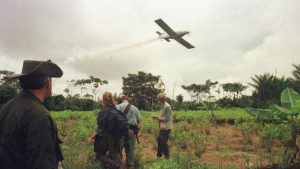By: Cole Baldecchi, 2L
Colombia battles the cultivation of coca plants, which is the main ingredient in cocaine. While the country has combatted the production of this plant with various methods—many of which have failed—it seems the Colombian government is once again looking back to an old ally against the fight: the aerial spraying of pesticides.
In 2015, the Juan Manuel Santos government banned the practice of aerial spraying after a World Health Organization report stated that glyphosate, the main pesticide used in aerial spraying, was linked to an increase in cancer rates. Glyphosate is the main ingredient in the commonly found weed-killer called Roundup. In 2017, the Colombian Constitutional Court issued a ruling stating that the government’s use of glyphosate would be banned unless it could be scientifically proven the pesticide was safe.
As part of peace deal with the Revolutionary Armed Forces of Colombia (FARC) guerilla group, the Santos Administration also instituted a crop-substitution program to combat coca production. FARC used coca cultivation as a primary revenue source to fund its rebellion against the central government. Known as the National Comprehensive Program for the Substitution of Illicit Crops, the government provided subsidies to rural farmers in exchange for the farmers to plant crops besides coca. The subsidies were essential, as many of Colombia’s rural farmers relied on coca cultivation to support their families. Over 120,000 rural farmers signed up for the program.
However, the program had poor infrastructural support from the Colombian government. In fact, 2017 marked the highest-level of cocaine production ever recorded in Colombia. To make matters worse, President Duque, who was elected in 2018, ran on a platform of ending or significantly altering the peace deal made with FARC. As Vice News documented this year, many rural farmers are at their breaking point and find themselves making a return to coca production.
As a vast majority of Colombian cocaine is sold and consumed in the United States, the Trump Administration is placing significant pressure on Duque’s government to increase efforts to eradicate coca cultivation. Since Colombia cannot use aerial spraying, it must send soldiers into the rural frontier to eradicate the crop. Often, these farms have concealed landmines and other hidden dangers planted by FARC and other rebel groups, leading to nine deaths in 2019.
The Duque Administration – in response to pressure from the United States, the dangers involved in ground-based coca eradication, and soaring coca production – wants to re-institute aerial pesticide spraying with glyphosate. However, in 2019, the Colombian Constitutional Court reaffirmed its 2017 decision regarding aerial spraying, which does permit the practice under certain conditions. Only time will tell whether aerial spraying will be reimplemented in Colombia.
Currently, glyphosate use is permitted in the European Union and the United States, but a growing number of countries and municipalities have banned the pesticide. Colombia has a lot of work to do before it can begin safely using the pesticide.





